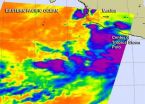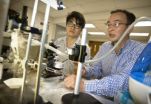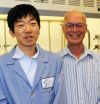(Press-News.org) NEW YORK, NY, September 17, 2014 - In a novel brain-imaging study among trauma victims, researchers at NYU Langone Medical Center have linked an opioid receptor in the brain -- associated with emotions -- to a narrow cluster of trauma symptoms, including sadness, emotional detachment and listlessness. The study, published online today in the journal JAMA Psychiatry, holds important implications for targeted, personalized treatment of post-traumatic stress disorder, or PTSD, a psychiatric condition affecting more than 8 million Americans that can cause a wide range of debilitating psychiatric symptoms.
"Our study points toward a more personalized treatment approach for people with a specific symptom profile that's been linked to a particular neurobiological abnormality," says lead author Alexander Neumeister, MD, director of the molecular imaging program in the Departments of Psychiatry and Radiology at NYU School of Medicine, and Co-Director of NYU Langone's Steven and Alexandra Cohen Veterans Center for the Study of Post-Traumatic Stress Disorder and Traumatic Brain Injury. "Understanding more about where and how symptoms of PTSD manifest in the brain is a critical part of research efforts to develop more effective medications and treatment modalities."
The new study confirms a growing body of evidence linking a particular set of symptoms to specific brain circuits and chemicals, and bolsters a shift within the field of psychiatry away from "one-size-fits-all treatments" and toward more individualized medication regimens that target highly specific neurobiological components. "We know from previous clinical trials that antidepressants, for example, do not work well for dysphoria and the numbing symptoms often found in PTSD," Dr. Neumeister added. "Currently available antidepressants are just not linked specifically enough to the neurobiological basis of these symptoms in PTSD. Going forward, our study will help pave the way toward development of better options."
"People with cancer have a variety of different treatment options available based on the type of cancer that they have," adds Dr. Neumeister. "We aim to do the same thing in psychiatry. We're deconstructing PTSD symptoms, linking them to different brain dysfunction, and then developing treatments that target those symptoms. It's really a revolutionary step forward that has been supported by the National Institute of Mental Health (NIMH) over the past few years in their Research Domain Criteria Project."
The study, funded by the National Institute of Mental Health (NIMH), compared the brain scans of healthy volunteers with those of clinically diagnosed trauma victims with PTSD, major depression, and generalized anxiety disorder whose symptoms ranged from emotional detachment to isolation. Participants received a harmless radioactive tracer that binds to and illuminates a class of opioid receptors, known as kappa, when exposed to high-resolution positron emission tomography (PET). Kappa opioid receptors bind a potent natural opioid known as dynorphin, which is released by the body during times of stress to help relieve dysphoria or numbing.
Chronic exposure to stress, such as the case with PTSD, taxes kappa opioid receptors, however, causing the receptors to retract inside cells, leaving dynorphin without a place to dock. As a result, patients can experience dysphoria, characterized by feelings of hopelessness, detachment and emotional unease.
Results showed that fewer available kappa opioid receptors in the brain regions believed to govern emotions were associated with more intense feelings of dysphoria, but not feelings of anxious arousal. The findings confirm previous studies in animals linking the opioid-receptor system expressed in these specific brain regions to symptoms of dysphoria. The study also found an association between lower levels of cortisol, a stress hormone, and unavailable kappa opioid receptors, suggesting a new role for cortisol as a biomarker for certain types of PTSD symptoms.
"This is the first brain-imaging study to explore any psychiatric condition using a protein that binds to the kappa opioid receptor system," notes Dr. Neumeister, who says the data support clinical trials under way at NYU Langone and other institutions of new medications that target kappa opioid receptors and other brain systems that can be linked to specific symptoms in trauma survivors. Such medications could be widely available for the treatment of PTSD in the future if ongoing clinical trials yield encouraging results.
This new research study also dovetails with work underway at NYU Langone's Steven and Alexandra Cohen Veterans Center for the Study of Post-Traumatic Stress Disorder and Traumatic Brain Injury, where Dr. Neumeister serves as Co-Director. The center is conducting numerous studies to advance the use of biomarkers to detect PTSD, TBI and other trauma-related illnesses. "Returning veterans are a particularly vulnerable population, so we are hopeful this research will lead to better treatments for them, since they represent an escalating demographic of victims of PTSD," he added. This research was conducted in collaboration with scientists at Yale School of Medicine, the School of Medicine at the University of California, San Diego, and the U.S. Department of Veterans Affairs National Center for Post-Traumatic Stress Disorder.
INFORMATION:
Funding
This study was funded by the National Institute of Mental Health (NIMH) through the following grants: R21MH096105, R21MH085627, R01MH096876, R01MH02566. It was also supported by Clinical and Translational Science Award Grant UL1RR024139 from the National Center for Research Resources and the National Center for Advancing Translational Science, components of the NIH, NIH Roadmap for Medical Research, and Clinical Neurosciences Division of the US Department of Veterans Affairs National Center for Posttraumatic Stress Disorder.
The funders/sponsors had no role in the design and conduct of the study: collection, management, analysis, and interpretation of the data; preparation, review, or approval of the manuscript; and decision to submit the manuscript for publication.
About NYU Langone Medical Center
NYU Langone Medical Center, a world-class patient-centered, integrated academic medical center, is one of the nation's premier centers for excellence in clinical care, biomedical research, and medical education. Located in the heart of Manhattan, NYU Langone comprises three hospitals—Tisch Hospital, its flagship acute care facility; the Rusk Institute of Rehabilitation Medicine, the world's first university-affiliated facility devoted entirely to rehabilitation medicine; and the Hospital for Joint Diseases, one of only five hospitals in the nation dedicated to orthopaedics and rheumatology—plus NYU School of Medicine, which, since 1841, has trained thousands of physicians and scientists who have helped to shape the course of medical history. The medical center's trifold mission to serve, teach, and discover is achieved 365 days a year through the seamless integration of a culture devoted to excellence in patient care, education, and research. For more information, go to http://www.NYULMC.org.
Brain imaging research pinpoints neurobiological basis for key symptoms associated with post-traumatic stress disorder like listlessness and emotional detachment in trauma victims
Study led by NYU Langone Medical Center bolsters support for new, personalized approaches to treating PTSD and other trauma-based disorders
2014-09-17
ELSE PRESS RELEASES FROM THIS DATE:
PTSD symptoms associated with increased food addiction
2014-09-17
Bottom Line: Symptoms of posttraumatic stress disorder (PTSD) were associated with increased food addiction, especially when individuals had more symptoms or the symptoms occurred earlier in life.
Authors: Susan M. Mason, Ph.D., of the University of Minnesota, Minneapolis, and colleagues.
Background: PTSD is a potentially severe psychiatric condition. A growing body of evidence suggests that PTSD is a risk factor for obesity and obesity-related diseases. Food addiction is not established as a psychiatric diagnosis but may indicate use of food to cope with psychological ...
Vitiligo treatment holds promise for restoring skin pigmentation
2014-09-17
VIDEO:
Henry Lim, M.D., chair of Dermatology, Henry Ford Hospital, highlights the study.
Click here for more information.
DETROIT – A treatment regimen is safe and effective for restoring skin pigmentation in vitiligo patients, according to a Henry Ford Hospital study.
"Our findings offer patients with vitiligo worldwide a renewed hope for a bright future in the treatment of this disfiguring disease," says Henry Lim, M.D., chair of Dermatology at Henry Ford and the study's ...
Combo of phototherapy, drug results in faster repigmentation in vitiligo
2014-09-17
Bottom Line: Patients with the skin depigmentation disease known as vitiligo had faster and better repigmentation after a combination therapy of the implantable drug afamelanotide and narrowband UV-B (NB-UV-B) phototherapy as part of a clinical trial.
Author: Henry W. Lim, M.D., of Henry Ford Hospital, Detroit, Mich., and colleagues.
Background: Vitiligo is characterized by white patches of skin and affects 1 percent to 2 percent of the population. The authors report the results of a multicenter randomized clinical trial comparing the safety and effectiveness of the ...
Chromosome buffers hold key to better melanoma understanding
2014-09-17
Buffers that guard against damage to the ends of chromosomes could hold the key to a better understanding of malignant melanoma – the deadliest form of skin cancer – according to new research from the University of Leeds.
The study has uncovered an important new genetic risk factor for melanoma.
It is well known that pigmentation and mole count are the strongest indicators of those most at risk of developing melanoma. For example, paler people should take more care in the sun, as they burn more easily.
It now appears that another risk factor is the length of telomeres, ...
NASA sees Tropical Storm Polo intensifying
2014-09-17
Tropical storm warnings now issued for a portion of the Southwestern coast of Mexico as Polo continues to strengthen. Infrared imagery from NASA's Aqua satellite showed powerful thunderstorms around the center of the storm.
A Tropical Storm Warning is in force for the southwest coast of Mexico from Punta San Telmo to Playa Perula. A Tropical Storm Watch is in force from Punta San Telmo to Zihuatanejo and from Playa Perula to Cabo Corrientes. Rainfall totals of 5 to 10, locally up to 15 inches, can be expected over coastal areas of Michoacan, Colima and Jalisco states ...
NASA sees Hurricane Edouard far from US, but creating rough surf
2014-09-17
Although NASA's Aqua satellite showed that Hurricane Edouard is far from U.S. soil, it is powerful enough that it is creating dangerous swells along the U.S. East Coast.
On Sept. 17, the National Hurricane Center noted "Swells from Edouard will affect portions of the east coast of the United States north of Florida beginning today. These swells will likely cause life-threatening rip current conditions along most of the United States east coast for the next couple of days."
When NASA's Aqua satellite passed over Hurricane Edouard on Sept. 16 the MODIS instrument captured ...
Shorebird's beak inspires UT Arlington research on water collection
2014-09-17
A UT Arlington engineering professor and his doctoral student have designed a device based on a shorebird's beak that can accumulate water collected from fog and dew.
The device could provide water in drought-stricken areas of the world or deserts around the globe.
Cheng Luo, professor in the Mechanical & Aerospace Engineering Department, and Xin Heng, PhD candidate in the same College of Engineering department, published "Bioinspired Plate-Based Fog Collectors" in the Aug. 25 edition of ACS' (American Chemical Society) Applied Materials & Interfaces journal. ACS also ...
Scripps Research Institute chemists modify antibiotic to vanquish resistant bacteria
2014-09-17
LA JOLLA, CA—September 17, 2014—Scientists at The Scripps Research Institute (TSRI) have devised a new antibiotic based on vancomycin that is powerfully effective against vancomycin-resistant strains of MRSA and other disease-causing bacteria.
The new vancomycin analog appears to have not one but two distinct mechanisms of anti-microbial action, against which bacteria probably cannot evolve resistance quickly.
"This is the prototype of analogues that once introduced will still be in clinical use a generation or maybe even two generations from now," said Dale L. Boger, ...
Habitual Facebook users more likely to be caught in phishing scams
2014-09-17
Washington, DC (September 17, 2014) – Receiving an email that claims you are the recipient of a large sum of money from an unknown deceased relative immediately raises a red flag. These email scams are often trashed or filtered through spam folders. But what about on social networks where there is no filter? Where people can learn about your personal life with a few clicks? A recent study published in the Journal of Computer-Mediated Communication by a researcher at the University at Buffalo – State University of New York found that people who habitually use Facebook were ...
Failed Medicare payments law remains relevant
2014-09-17
PROVIDENCE, R.I. [Brown University] — As Congress adjourns this month for the November elections, one of the killed bills senators will step over on their way out the chamber door will be the Sustainable Growth Rate (SGR) Repeal and Medicare Provider Payment Modernization Act of 2014. In a new commentary in the journal JAMA Surgery, Dr. Eli Adashi recounts what he and other advocates saw as the merits of the originally bipartisan bill. The perennial trouble with how Medicare pays doctors will return for the next Congress, Adashi said, and broader trends in health care practice ...
LAST 30 PRESS RELEASES:
Clearing the brain of aging cells could aid epilepsy and reduce seizures
Brain injuries linked with potential risk of suicide, new study finds
New technique lights up where drugs go in the body, cell by cell
New study finds movement of fishing fleets can reveal shifts in marine ecosystems
Embargoed: New evidence points to potential treatment for vascular dementia
Study uncovers disrupted brain balance in alcohol dependence
Working in groups can help Republicans and Democrats agree on controversial content moderation online
Structural findings reveal how distinct GPCR ligands create different levels of activation
Anything-goes “anyons” may be at the root of surprising quantum experiments
UC review: Maximizing workplace opportunity for veterans
From generation to complex control: Metasurfaces make perfect vortex beams "within reach"
Thin-film lithium niobate-based detector: recent advances and perspectives
Exploring why some people may tend to persistently make bad choices
How cells balance their protein levels
Nirsevimab vs RSVpreF vaccine for RSV–related hospitalization in newborns
Effectiveness and impact of maternal RSV immunization and nirsevimab on medically attended RSV in US children
AI gives scientists a boost, but at the cost of too many mediocre papers
Next-generation vision model maps tree growth at sub-meter precision
Genes aren’t destiny for inherited blindness, study shows
MIT study: High-fat diets make liver cells more likely to become cancerous
Exposure to multiple fine particulate matter components and incident depression in the US Medicare population
Risk of burdensome health care spending over time in the US
Nirsevimab against hospitalizations and emergency department visits for lower respiratory tract infection in infants
New microfluidics technology enables highly uniform DNA condensate formation
A new strategy for immune tolerance
Super Mario Bros. help fight burnout: New study links classic games to boosted happiness
Deepest gas hydrate cold seep ever discovered in the arctic: International research team unveils Freya Hydrate Mounds at 3,640 m depth.
Integrating light and structure: Smarter mapping for fragile wetland ecosystems
ACA-SIM: A robust way to decode satellite signals over complex waters
Probiotics can restore gut microbiome in breastfed infants
[Press-News.org] Brain imaging research pinpoints neurobiological basis for key symptoms associated with post-traumatic stress disorder like listlessness and emotional detachment in trauma victimsStudy led by NYU Langone Medical Center bolsters support for new, personalized approaches to treating PTSD and other trauma-based disorders




